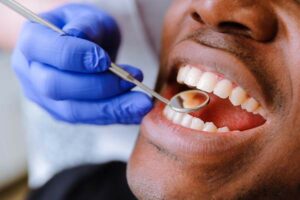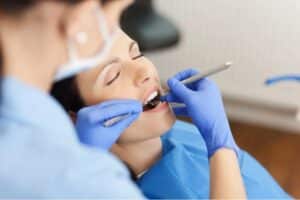Dental implants are screw-like prostheses that are surgically placed into your jawbone and serve as a replacement for a dental root. Once the implant is in place, new bone cells will grow around the threads and eventually turn into hardened bone. This is a process called osseointegration and can take 3-5 months. Only then will you get a permanent crown over this implant as support. The dental implant surgery can initially impact your diet due to the healing process and the need to protect the implant site, but they are designed to work very much like regular teeth afterward. Here’s how they might affect your diet:
- Immediately after the surgery: Right after the implant surgery, you’ll likely need to stick to a soft food diet. We often also recommend sticking to a cold diet on the first day. This helps prevent irritation or damage to the implant site and allows for proper healing. The cold also helps the clotting and excessive bleeding. On the second day you can have soft, lukewarm foods like mashed potatoes, yogurt, smoothies, pasta, and soft, cooked vegetables. You may start getting back to normal on the third day. Keep in mind the third day is the peak of discomfort and inflammation, so keep ice and cold foods handy.
- Avoidance of certain foods. During the first week, you will likely be under preventive antibiotics, so it is vital to suspend all alcohol intake while on treatment. Hard, crunchy, sticky, or tough foods can potentially disrupt the healing process or put pressure on the sensitive implant area. We also recommend avoiding grains to prevent them from getting into the implant area. After the wound starts to heal and close, or the stitches fall, you may return to normal eating habits.
- Gradual transition: As the implant site heals and the implant becomes more stable, your dentist will gradually allow you to reintroduce a wider variety of foods into your diet. This transition is especially true in the case of all-on-4 surgery procedures, in which you must also learn to eat and speak with a full, removable denture. This is certainly a process that you must allow yourself to be patient with. In time, denture wearers learn to eat most foods, even if they have to cut everything.
- Long-term considerations: Once the implant has fully integrated with the jawbone and the healing process is complete, you should be able to eat most foods without restrictions. Dental implants are designed to function like natural teeth, allowing you to enjoy a varied diet without limitations in the long term. Whether with crowns, dental implants, or fixed all-on-4s, the main dietary restriction is chewing very hard things like ice, whole nuts, and biting off foods like apples. These can break any porcelain restoration.
In short, it’s crucial to follow your dentist’s instructions diligently after getting dental implants. This helps ensure proper healing and successful integration of the implant, avoiding infections, and having an overall positive experience. As the healing progresses, your diet will gradually return to normal, allowing you to enjoy your favorite foods again. We are the Costa Rica Dental Team, a dental office located in San Jose, Costa Rica that specializes in complex restorations involving crowns, implants and even All-on-4. We have an awesome team of dentists and specialists that will be ready to provide you the dental treatment you need at a price you can afford. We care to look at you as a person and give the attention you deserve to have a positive experience. Contact us now to find out how to get started!




